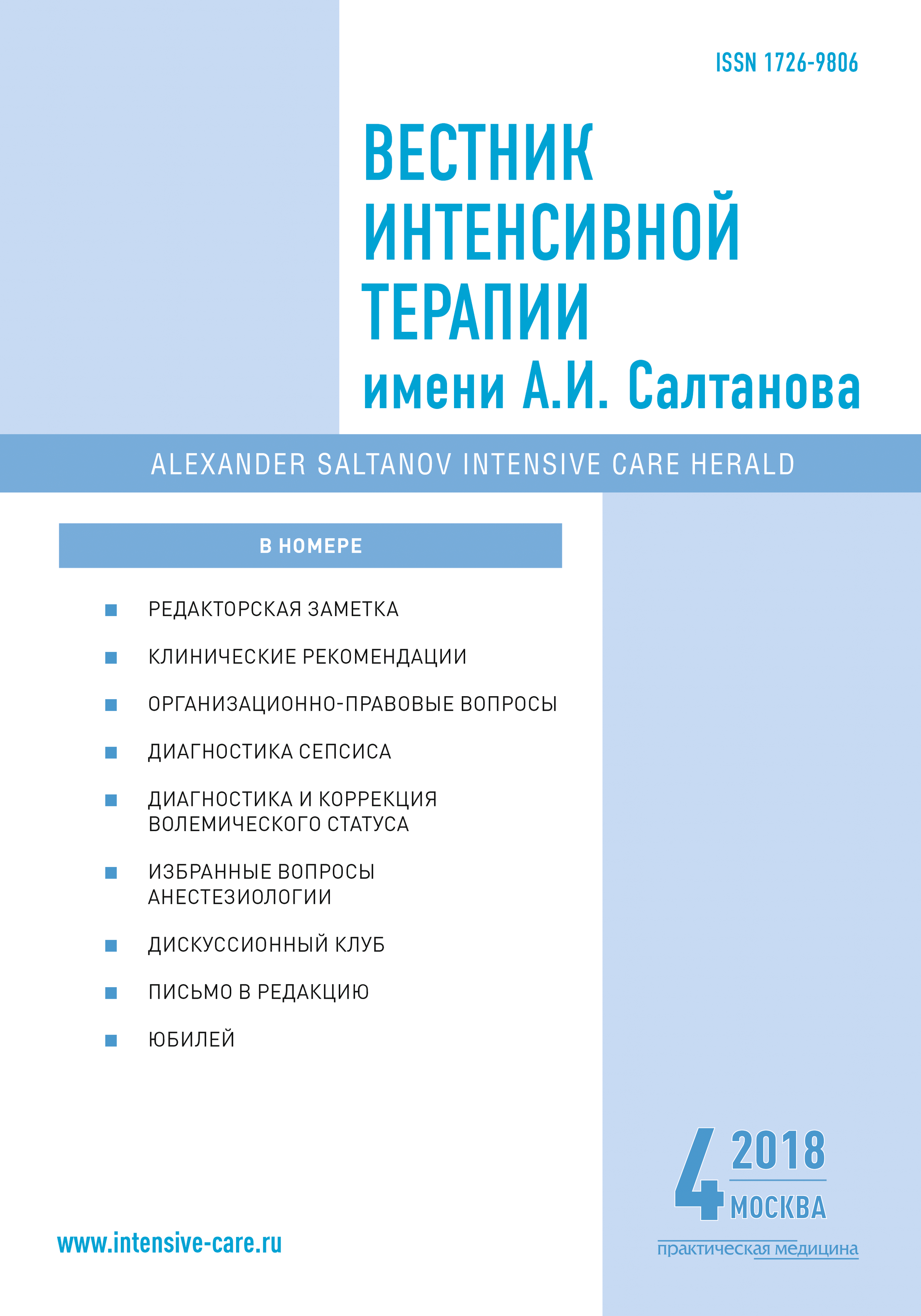Аннотация
Цель исследования. Определение возможности профилактического применения отечественного препарата Цитофлавин для снижения частоты развития когнитивных нарушений после тотальной внутривенной анестезии на основе пропофола и фентанила у детей школьного возраста.
Материал и методы. Проведено проспективное рандомизированное клиническое исследование, включившее 90 детей школьного возраста (ASA I–II). Дети, оперированные в условиях тотальной внутривенной анестезии на основе пропофола и фентанила, были рандомизированы на две группы: в 1-й группе (n = 30) проводили интраоперационную церебропротекцию Цитофлавином 0,25 мг/кг/мин по сукцинату, во 2-й группе (n = 30) церебропротекцию не проводили. Для Z-оценки когнитивного потенциала было выполнено нейропсихологическое тестирование детей того же возраста, не подвергавшихся анестезиологическому пособию, —3-я группа (n = 30).
Результаты исследования. Не получено достоверных отличий гемодинамических и нейрофизиологических параметров в группах при использовании тотальной внутривенной анестезии (ТВА) на основе пропофола и фентанила. Анализ этих параметров показал безопасность применения исследуемого препарата. В 1-й группе послеоперационная когнитивная дисфункция (ПОКД) была выявлена в 1-е сут у 6,67 % детей, а на 7-е сут послеоперационного периода — у 3,33 %. Во 2-й группе в 1-е сут послеоперационного периода ПОКД была верифицирована у 13,79 % пациентов, на 7-е сут — у 27,59 %.
Заключение. Полученные данные показали эффективность и безопасность отечественного препарата Цитофлавин как профилактического средства ПОКД у детей школьного возраста при ТВА на основе пропофола и фентанила.
Библиографические ссылки
- Disma N., Hansen T.G. Pediatric anesthesia and neurotoxicity: can findings be translated from animals to humans? Minerva Anestesiol. 2016; 82: 791–796.
- DiMaggio C., Sun L., Li G. Early childhood exposure to anesthesia and risk of developmental and behavioral disorders in a sibling birth cohort. Anesth. Analg. 2011; 113: 1143–1145. DOI: 10.1213/ANE.0b013e3182147f42.
- ОвезовА.М., Князев А.В., Пантелеева М.В. и др. Послеоперационная энцефалопатия: патофизиологические и морфологические основы профилактики при общем обезболивании. Неврология. Нейропсихиатрия. Психосоматика. 2015; 2(7): 61–65. [Ovezov A.M., Knyazev A.V., Panteleeva M.V., et al. Postoperative encephalopathy: Pathophysiological and morphological bases of its prevention under general anesthesia. Nevrologiya. Neiropsikhiatriya. Psikhosomatika. 2015; 2(7): 61–65. (In Russ)]. DOI: 10.14412/2074-2711-2015-2-61-66.
- Jevtovic-Todorovic V. General Anesthetics and Neurotoxicity. How Much Do We Know? Anesthesiol. Clin. 2016; 34(3): 439–451. DOI: 10.1016/j.anclin.2016.04.001.
- Vutskitsa L., Davidson A. Update on developmental anesthesia neurotoxicity. Curr. Opin. Anesthesiol. 2017; 30: 337–342. DOI: 10.1097/ACO.0000000000000461.
- Montana M., Evers A.S. Anesthetic Neurotoxicity: New Findings and Future Directions. J. Pediatr. 2017; 181: 279–285. DOI: 10.1016/j.jpeds.2016.10.049.
- Rasmussen L.S., Larsen K., Houx P., et al. ISPOCD group. The International Study of Postoperative Cognitive Dysfunction. The assessment of postoperative cognitive function. Acta Anaesthesiol. Scand. 2001; 45(3): 275–289.
- Новицкая-УсенкоЛ.В. Послеоперационная когнитивная дисфункция в практике врача-анестезиолога. Медицина неотложных состояний. 2017; 4(83): 9–15. [Novitskaya-Usenko L.V. Post-operative cognitive dysfunction in an anesthesiologist’s practice. Emergency Medicine. 2017; 4(83): 9–15. (In Russ)]. DOI: 10.22141/2224–0586.4.83.2017.107418.
- ОвезовА.М., Лобов М.А., Машков А.Е и др. Частота развития и возможность коррекции послеоперационной когнитивной дисфункции у детей школьного возраста при современных вариантах анестезиологического обеспечения. Consilium Medicum. Педиатрия. (Приложение). 2013; 03: 16–20. [Ovezov A.M., Lobov M.A., Mashkov A.E., et al. Chastota razvitiya i vozmozhnost’ korrektsii posleoperatsionnoi kognitivnoi disfunktsii u detei shkol’nogo vozrasta pri sovremennykh variantakh anesteziologicheskogo obespecheniya. Consilium Medicum. Pediatriya. 2013; 03: 16–20. (In Russ)]
- Pearn M.L., Hu Y.B.S., Niesman I.R., et al. Propofol Neurotoxicity Is Mediated by p75 Neurotrophin Receptor Activation. Anesthesiology. 2012; 116: 1–10. DOI: 10.1097/ALN.0b013e318242a48c.
- ЛобовМ.А., Древаль А.А., Овезов А.М. и др. Влияние пропофола на гиппокамп развивающегося мозга. Анналы клинической и экспериментальной неврологии. 2013; 7(3): 42–46. [Lobov M.A., Dreval A.A., Ovezov A.M., et al. Influence of propofol on hippocampus in developing brain: an experimental study. Annaly klinicheskoi i eksperimental’noi nevrologii. 2013; 7(3): 42–46. (In Russ)]
- ЕлькинИ.О., Егоров В.М., Блохина С.И. Операционный стресс, общая анестезия и высшие психические функции. Екатеринбург: Клен, 2007. [El’kin I.O., Egorov V.M., Blokhina S.I. Operatsionnyi stress, obshchaya anesteziya i vysshie psikhicheskie funktsii. Ekaterinburg: Klen, 2007. (In Russ)]
- Euliano Т. Effects of General Anesthesia During Pregnancy on the Child’s Ability to Learn. Anesthesiology Clin. 2013; 31(3): 595–607. DOI: 10.1016/j.anclin.2013.04.003.
- ЗаваденкоН.Н., Григоренко Е.Л., Баранов А.А. и др. Синдром дефицита внимания с гиперактивностью: этиология, патогенез, клиника, течение, прогноз, терапия, организация помощи. Экспертный доклад. М., 2007; 64. [Zavadenko N.N., Grigorenko E.L., Baranov A.A., et al. Sindrom defitsita vnimaniya s giperaktivnost’yu: etiologiya, patogenez, klinika, techenie, prognoz, terapiya, organizatsiya pomoshchi. Ekspertnyi doklad. M., 2007; 64. (In Russ)]
- Овезов А.М., Пантелеева М.В., Луговой А.В. Интраоперационная церебропротекция при тотальной внутривенной анестезии у детей школьного возраста. Журнал неврологии ипсихиатрии им. С.С. Корсакова. 2017; 10: 28–33. [Ovezov A.M., Panteleeva M.V., Lugovoy A.V. Intraoperative cerebroprotection in total intravenous anesthesia in children of school age. S.S. Korsakov Journal of Neurology and Psychiatry. 2017; 10: 28–33. (In Russ)]. DOI: 10.17116/jnevro201711710128–33.

Это произведение доступно по лицензии Creative Commons «Attribution-NonCommercial-ShareAlike» («Атрибуция — Некоммерческое использование — На тех же условиях») 4.0 Всемирная.
Copyright (c) 2018 ВЕСТНИК ИНТЕНСИВНОЙ ТЕРАПИИ имени А.И. САЛТАНОВА

